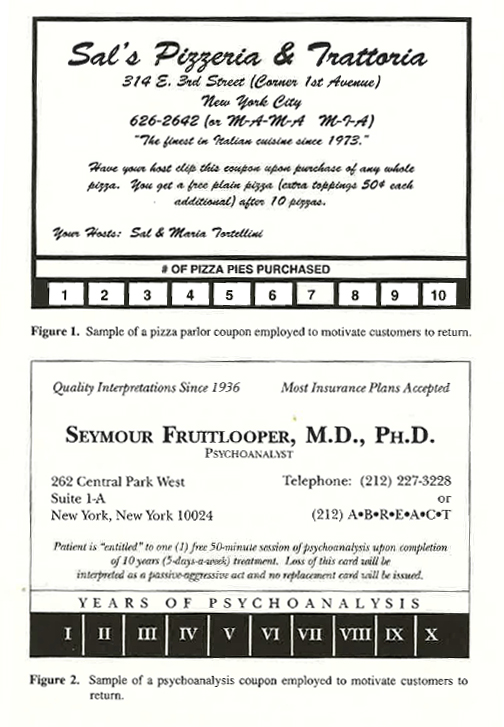Ernst von Krankman, Ph.D.
In both the pizza parlor and psychoanalysis businesses, the business owners have been traditionally faced with the problem of motivating the clientele to return. This is a dilemma particularly as both businesses pretty much depend on repeat customers. Wily pizza parlor managers, intrinsically pragmatic in nature, have had no hesitation in applying the scientifically based principles of the behavioral sciences in attempting to modify customer behavior to fulfill their own needs – profitability and nice cash flow. However, the same cannot be said for psychoanalysts who, reluctant to employ the principles of modern day learning and motivational theory, suffer lower clientele return rates (also known as “higher drop-out rates”) than do pizza parlor owners. Viennese-like vendors of psychoanalysis could learn a lot about enticing their customers to return by looking to their Neapolitan business brethren for key motivational paradigms.
For these merchants of mozzarella cheese, tomato paste, and dough only one key motivational principle has been effective in ensuring consistent sales of pizza pies – put the customer on a reinforcement schedule for reward. In theory, nice and clean; in practice, simple and easy to implement: For each pizza pie ordered the customer gets credit toward a free pizza pie. Earn enough credits, and the free pizza pie is yours. (See Figure 1.) It is not hard to imagine how a similar reinforcement schedule could be implemented for the customers of psychoanalysis. (See Figure 2.)
Armed with a scientifically based motivational tool borrowed from pizza purveyors, psychoanalysts will now be able to counteract the powerful forces of “resistance” that so often undermine the course of psychoanalytic treatment – and lead to premature termination of the all-important psychoanalyst-customer relationship.

© Copyright 1990 Wry-Bred Press, Inc./Glenn Ellenbogen. All rights reserved.
